Check out our latest updates featured in the KNAERative Issue 2! See updates from our CoPs, learn about upcoming events, and find out how you can get involved.
You can find the full KNAERative newsletter here.
Réseau de connaissances en mathématiques
Check out our latest updates featured in the KNAERative Issue 2! See updates from our CoPs, learn about upcoming events, and find out how you can get involved.
You can find the full KNAERative newsletter here.
Want to know what we’ve been up to? Read the updates below to learn about network growth, resources, upcoming sharing, and our Communities of Practice in Year 2!
Network Growth
We have grown to include over 14 school districts, 15 universities, and 16 organizations!

MKN Website & TeachOntario
Upcoming Sharing
Find more details on our events page.
Communities of Practice
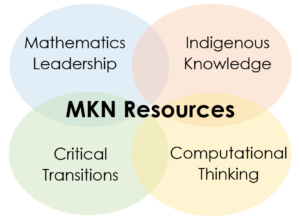 Our four CoPs completed their Year 1 activities and have created and shared various resources such as research minis, documentaries, lesson plans, literature reviews, and more.
Our four CoPs completed their Year 1 activities and have created and shared various resources such as research minis, documentaries, lesson plans, literature reviews, and more.
CoP leads met on October 24, 2017 to share their work from Year 1, discuss future plans, and find cross-CoP connections. Attendees represented all 4 CoPs, the MKN Executive, TVO, KNAER, and the Ministry of Education. CoP leads will meet again in January 2018 to report on progress, share artifacts, and discuss next steps.
CoPs in Year 2 (Sept 2017 – Aug 2018)
Computational Thinking in Mathematics Education
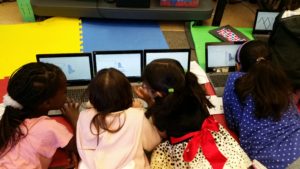
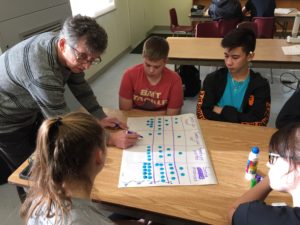
See mathnetwork.ca/ct for more information. You can find a more detailed Year 1 overview and plans for Year 2 here.
Critical Transitions in Student Mathematical Development
See mathnetwork.ca/transitions for more information. See their detailed Year 1 overview here.
Indigenous Knowledge & Mathematics Education
See mathnetwork.ca/indigenousknowledge for more information.
Mathematics Leadership
See mathnetwork.ca/math-leadership for more information.
View this post as a 2-page summary!
By Jeff Cummings, Wellington Catholic District School Board

Two years ago, the Wellington Catholic District School Board began an exciting and innovative journey with Dr. George Gadanidis in Technology Enabled Learning as we attempted to redefine the classroom experience to include engagement tasks in Computational Thinking. The focus of our district journey was in Innovation in Grade 3 and 4 classrooms with an emphasis on increasing student engagement. We quickly progressed to developing a vision of a learning journey where students could travel a path in our schools learning Coding embedded in the Math Curriculum.
The work is quickly evolving to address 21st Century competencies with a significant focus on modernizing learning environments to be responsive to student needs, and to emphasize Mathematics tasks that instill a vision of the learner that can achieve a high ceiling if engaged through this dynamic way of modelling and solving Mathematical questions. Learning tasks not only promote Math and Computational Skills but also promote inclusion, and equity.

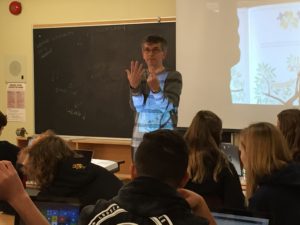
This year our learning journey continues to evolve as we work to create a path of learning throughout our system where students are exposed to dynamic Mathematical challenges in coding environments. Our first project is an Elementary Leadership Project in Math and Computational Thinking which focuses on expansion of our program by mentoring leader teachers, who are challenged to empower other teachers in our system to integrate coding in Math activities. This year’s project will support four Digital Mentors in developing fluency in modelling effective computational skill through integration with the Math curriculum. Digital mentors will learn how to utilize strategies to mobilize knowledge and share through a collaborative fashion intensively at school sites and through other professional learning opportunities created with support from Technology Enabled Learning program.
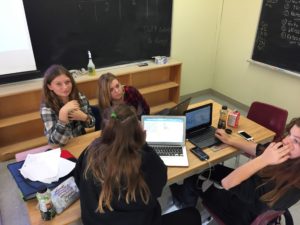
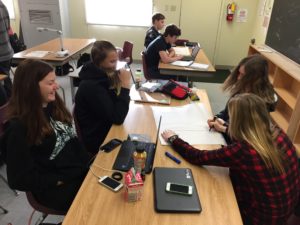
While we were excited with the pathway we were creating for students in this innovative learning strategy, we wanted to provide a unique destination for the end of learning journey to provide students increased opportunities and access to the high priority technological skills of the modern global society. Using a Universal Design for Learning, we developed the Grade 10 Math & Coding Double Credit Program. This program created a learning environment that de-streamed learners and opened the door to all abilities. The focus of the 2017-18 Grade 10 Math & Coding double credit program was to work with teachers to develop innovative ways to identify and deliver big ideas in Grade 10 Mathematics and Computer Science (ICS2O) using engaging Computer Science programs such as Scratch and Python to model mathematical concepts and solve problems. The course took an interdisciplinary approach to instructional design by delivering integrated content to combine expectations and create extra time for students to focus on development of “Passion Projects” where they are challenged to identify a problem that requires a solution using computational science skills. Personal projects are the focus of innovation in this course, creating “Moonshot Ideas” where students can work through a project that they plan, create, research, and solve with the teacher facilitating. A major focus of the project is re-conceptualizing the learning environment to integrate principles of equity, inclusion and empowerment of marginalized learners to engage students with challenging and achievable tasks.
It is our hope that the learning journey will increase student interest in Computer Science courses in Grade 11 and 12 which will provide learners skillsets, unique abilities, and strengths that maximize their potential to be successful in postsecondary education and the workforce. Wellington Catholic District School Board will continue to find innovative ways to deliver Coding and foster Computational Skills in our students.
This blog was written by Jeff Cummings, ELearning Coordinator at Wellington Catholic DSB, and member of our Computational Thinking Community of Practice.
Check out the 2016-2017 Project Overview of the Wellington Catholic DSB’s work in this video!
Follow along with their work on Twitter @Grade10CODING, #WEcode, and @MrJCummings.
Several opportunities for learning and sharing are coming up this month! Learn more about these opportunities and how you can get involved below.
Computational Thinking in Mathematics Education Symposium, October 13-15
The Math Pod, October 11, 18, 25, & November 1
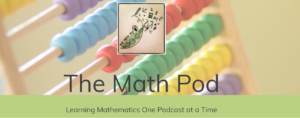
The Math Pod is an OPEN learning opportunity organized in collaboration between three regions in the Province of Ontario:
The Math Pod is a collaborative learning space for educators who want to learn more about mathematics. They will be engaging with researchers through podcasts, blogging and Twitter chats.
Join them for their Fall series of podcasts on October 11, 18, 25, and November 1 at 8 p.m. with Cathy Fosnot and Stephen Hurley. Learn more at themathpod.ca and follow them on twitter @TheMathPod for regular updates!
NOMA Mini Conference with Cathy Fosnot: The Development of Numeracy, K-8, October 21
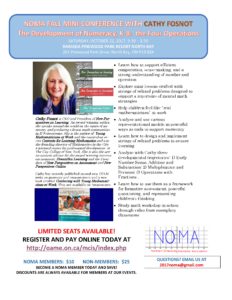
FNMIEAO Educator Conference, October 28-29
Registration and all other conference details can be found on their guidebook.
OAME 2018 Session Proposals: Due November 1st
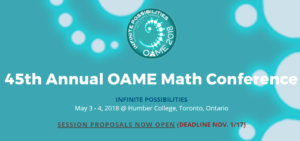
The OAME 2018 conference will take place on May 3-4, 2018. Be sure to submit your session proposal here before November 1, 2017!